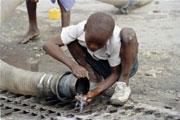 縮寫【WTO】,除了代表世貿組織,其實還代表聯合國推動的「世界廁所日」(World Toilet Day),這三個字母的背後,代表著全球有25億窮人,連廁所這項基本的衛生設施,對他們而言,都是遙不可及的夢。
縮寫【WTO】,除了代表世貿組織,其實還代表聯合國推動的「世界廁所日」(World Toilet Day),這三個字母的背後,代表著全球有25億窮人,連廁所這項基本的衛生設施,對他們而言,都是遙不可及的夢。
WTO世界廁所日是在每年的11月19日,為了凸顯窮人面對的環境衛生危機,聯合國大會也宣布將2008年訂為國際環境衛生年(International Year of Sanitation),與世界廁所日的行動結合,共同改善此世界環境衛生問題,讓廁所不再是全球40%民眾遙不可及的夢。
葡萄牙籍的聯合國獨立人權專家愛爾布葵克(Catarina de Albuquerque)律師11月18日在日內瓦提出一項聲明,說明全世界有25億人口,每天處在環境衛生十分惡劣的狀況下,成為傳染性疾病散佈的溫床,而這25億人口中大約有10億是兒童。她並呼籲有能力的國家應合力進行捐贈及投資,協助改善現況,消彌危機,維護這些人的基本尊嚴。
馬桶等衛生設備是許多人公認自1840年以來最重要的醫學貢獻,比抗生素、疫苗及麻醉法的貢獻還大。愛爾布葵克表示,由許多可信的證據顯示,這項投資能製造極高的效益,每投資1美元大約可獲得9美元的成效。投資在改善衛生的成效來自改善健康狀況及生活品質後所節省的醫療費用,以及其所增加的生產力,並降低學生經常性生病缺課,所造成的教育水準落差。
她指出,全球每天約有5000個兒童因下痢而死亡,幾乎每20秒就有一名兒童死於相關疾病,而治療相關疾病所花的費用大約佔下沙哈拉非洲國家12%的國家衛生經費;嬰幼兒死亡,學生及勞工因學校及工作環境衛生條件不良,導致疾病散播而缺課及請假,每年造成的全球經濟損失大約是380億美元;更根本的是,衛生設備的不足迫使民眾在大庭廣眾下排便,損及個人尊嚴。
雖然有證據顯示這樣的投資效益很高,然而愛爾布葵克也表示,這樣的行動卻仍然是千禧發展目標(the Millennium Development Goal,MDG)裡最受忽略、達成率最低的標的。MDG是由全球領袖共同決議的一系列行動目標,以在2015年之前減少社會經濟上的弊病,這些目標包括將全球缺乏安全飲水及基礎衛生設備的人口減半。
11月19日也有6個國際非營利團體一起發表聲明,同聲呼籲國際重視這個全球性的水質與環境衛生危機。這6個團體包括PATH衛生科技推廣組織、地球日網絡(Earth Day Network)、自然資源保護委員會(Natural Resources Defense Council)、擁護水資源組織(Water Advocates)、Water For People國際組織、水及環境衛生計畫(Water and Sanitation Program,WSP)。
地球日網路的國際專案主任威瑞爾(Caitlin Werrell)表示:「提供民眾基本衛生設施,即能明顯地改善民眾生活,協助破除貧窮的惡性循環」。自然資源保護委員會國際專案律師中川(Melanie Nakagawa)表示:「缺乏衛生設施是被掩藏的全球醜聞,這對人類尊嚴而言是極嚴重的公開侮辱」。
水及環境衛生計畫經理Jaehyang So指出:「每年有數以百萬計的兒童正因糞便至口腔的途逕,感染下痢性疾病死亡,這是可避免且很容易就阻斷的路徑」。她還表示:「根據WSP於2008年稍早的報告,2006年印尼因環境衛生不良所造成的國家經濟損失大約是63億美元,也就是2.3%的當地整體產值。之前的報告也顯示,在緬甸的類似損失為7.2%,寮國為6.4%,菲律賓為1.5%,越南為1.3%。」
PATH組織的輪狀病毒疫苗專案主任衛克(John Wecker)博士指出:「不管我們所要協助的人住在哪裡或是有沒有錢,提供衛生設施給全世界每一個人,可以使我們在減少兒童下痢疾病以及協助他們在開始新生活的行動上邁出一大步。」
世界廁所日希望鼓勵各國政府展開行動,改善環境衛生及建立衛生習慣。這些行動對於減少霍亂(cholera)、腸道寄生蟲、痢疾、肺炎、腹瀉及皮膚感染等令人衰弱不振,甚至死亡的的惡疾將有很大助益,同時也將協助學童(尤其是女學童)持續接受教育。
Boosting the standard of sanitation in poor countries worldwide is a matter of basic human dignity, and yet 40 per cent of the global population still does not have access to toilets, a United Nations rights expert said today, calling for donor investment to be stepped up to save lives and reduce the spread of diseases.
UN Independent Expert Catarina de Albuquerque issued a statement in Geneva – on the eve of World Toilet Day tomorrow – saying that the scale of the crisis is enormous, with an estimated 2.5 billion people lacking access to decent sanitation.
"There is compelling evidence that sanitation brings the single greatest return on investment of any development intervention – roughly $9 for every $1 spent,” Ms. de Albuquerque said. “Yet it remains the most neglected and most off-track of the Millennium Development Goal (MDG) targets."
The MDGs are a series of targets agreed upon by world leaders for reducing social and economic ills, all by 2015, and they include the goal of halving the proportion of people without safe drinking water and basic sanitation.
But Ms. de Albuquerque, who is the Independent Expert on the issue of human rights obligations attached to access to safe drinking water and sanitation, said the question of sanitation has been treated as “a taboo topic” for too long.
"Investing in sanitation will not only lead to the enjoyment of human rights, but will also contribute to improved development outcomes and overall living standards."
The Independent Expert noted that poor sanitation leads to devastating consequences. An estimated 5,000 children die from diarrhoea every day, and treating diseases related to diarrhoea costs an average of 12 per cent of national health budgets in sub-Saharan African countries. Lack of toilets in schools increases the number of student absences, and worker productivity also suffers through widespread disease and illness. More basically, being forced to defecate in public is an affront to human dignity.
"Infant deaths, lost work days and missed school are estimated to have an economic cost of around $38 billion per year,” according to Ms. de Albuquerque, who added that sanitation is considered by many to be the most important medical advance since 1840 – superior to antibiotics, vaccines and anaesthesia.
Independent Experts such as Ms. de Albuquerque serve in an independent and unpaid capacity and report to the UN Human Rights Council in Geneva. The Portuguese lawyer took up her post on 1 November.


